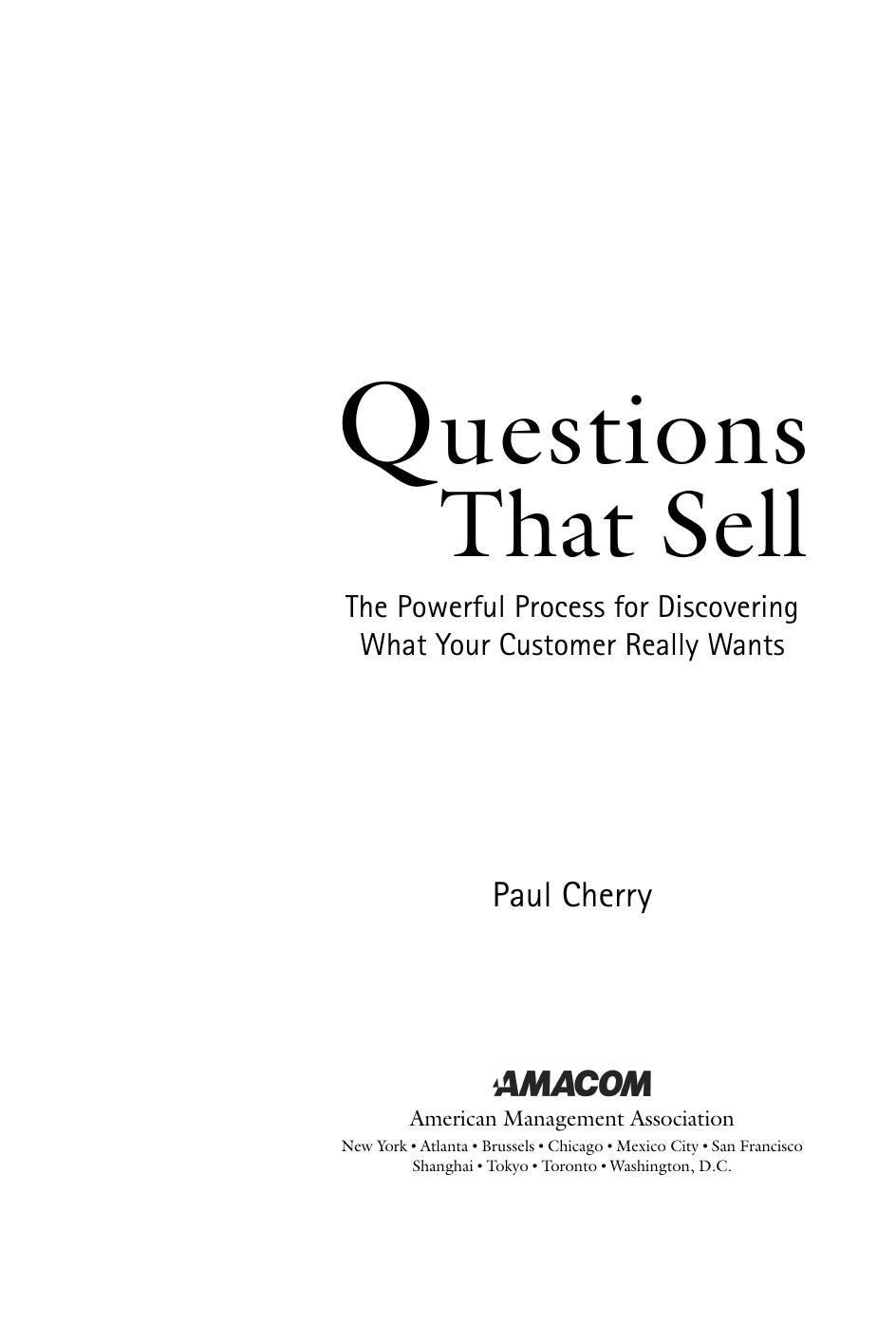Questions That Sell: The Powerful Process for Discovering What Your Customer Really Wants by Paul Cherry

Author:Paul Cherry
Language: eng
Format: mobi, pdf
Published: 2009-10-30T14:40:00+00:00
• For how long have your needs not been met?"
• "What criteria are you using to determine who can best meet your needs?"
• "Which of your needs are most important and which are least important?"
• You mentioned we; who else has input into this decision?"
• "How will the decision to pursue a new option be made?"
• "Let's assume your needs can be met; what do you hope to accomplish?"
By now you should be able to appreciate all of the opportunities secured when you use lock-on questions. It is important to remember, however, that lock-on questions cannot be effective if you do not listen to your customers. Too many of us have fallen into the habit of not listening to the answers our customers give. I know I have made this mistake myself. Instead of listening, I am thinking of my next question! Lock-on questions not only force you to listen; they also take the pressure off of you to think of another question. The question will appear right in front of you-if only you listen to your customer's words.
The lock-on questioning technique is difficult for many salespeople to embrace. So many sales professionals are programmed with their own agendas, they want to provide a solution without really listening to the problem. It is unfortunate that so many of us have become arrogant in our belief that we know what is best for our customers. The truth is that every situation is different. Even if you are thinking, "I've heard this a dozen times before," in reality the customer has specific concerns and individual motivations that you cannot possibly know unless she tells you. Lock-on questions not only provide a tool to use in your meetings; they also force you to take the time to listen to your customers.
How to Manage a Conversation Using Lock-On Questions
Now that you have learned how to focus on a customer's emotions using the lock-on technique, you can begin to appreciate other ways it can be used. Many salespeople are wary at first about my system of questioning because they are afraid of losing control of the conversation. What they do not realize is that by asking the questions, they are the ones in control. Asking the customer questions gives you the power to direct the conversation, instead of simply presenting your product and hoping the customer becomes interested.
Download
Questions That Sell: The Powerful Process for Discovering What Your Customer Really Wants by Paul Cherry.pdf
This site does not store any files on its server. We only index and link to content provided by other sites. Please contact the content providers to delete copyright contents if any and email us, we'll remove relevant links or contents immediately.
| Direct | Global |
| Industrial | Multilevel |
| Product Management | Research |
| Telemarketing | Web Marketing |
Influence: The Psychology of Persuasion by Robert B. Cialdini(4173)
The Miracle Morning by Hal Elrod(3903)
The Hacking of the American Mind by Robert H. Lustig(3575)
Pre-Suasion: A Revolutionary Way to Influence and Persuade by Robert Cialdini(3404)
Unlabel: Selling You Without Selling Out by Marc Ecko(2975)
Hidden Persuasion: 33 psychological influence techniques in advertising by Marc Andrews & Matthijs van Leeuwen & Rick van Baaren(2771)
Who Can You Trust? by Rachel Botsman(2729)
Kick Ass in College: Highest Rated "How to Study in College" Book | 77 Ninja Study Skills Tips and Career Strategies | Motivational for College Students: A Guerrilla Guide to College Success by Fox Gunnar(2716)
Purple Cow by Seth Godin(2694)
Ogilvy on Advertising by David Ogilvy(2677)
I Live in the Future & Here's How It Works by Nick Bilton(2520)
This Is Marketing by Seth Godin(2477)
The Marketing Plan Handbook: Develop Big-Picture Marketing Plans for Pennies on the Dollar by Robert W. Bly(2408)
The Power of Broke by Daymond John(2373)
Building a StoryBrand by Donald Miller(2357)
The 46 Rules of Genius: An Innovator's Guide to Creativity (Voices That Matter) by Marty Neumeier(2305)
Draw to Win: A Crash Course on How to Lead, Sell, and Innovate With Your Visual Mind by Dan Roam(2275)
The Tipping Point by Malcolm Gladwell(2200)
Market Wizards by Jack D. Schwager(2155)
